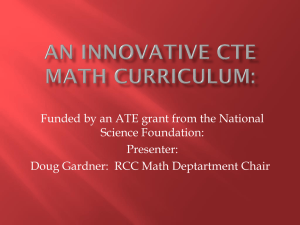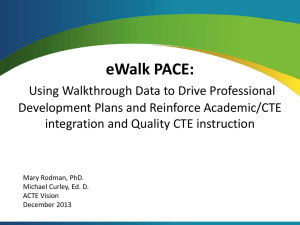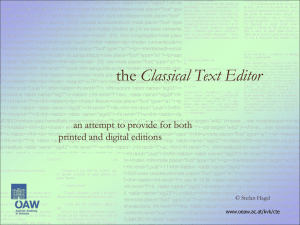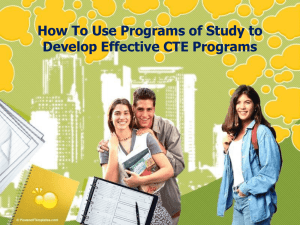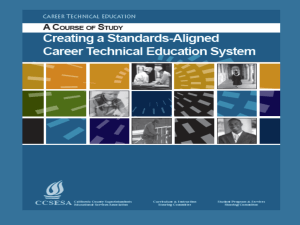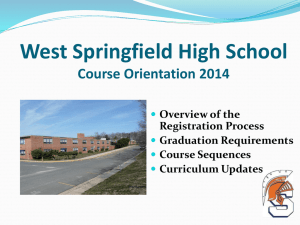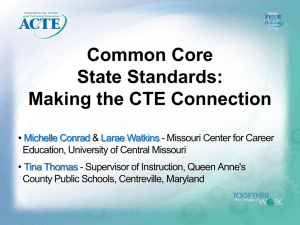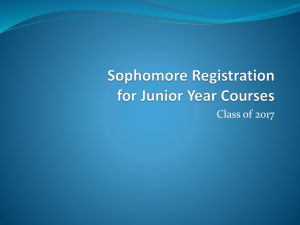Changing the Culture: Rigor, Relevance and Relationships
advertisement
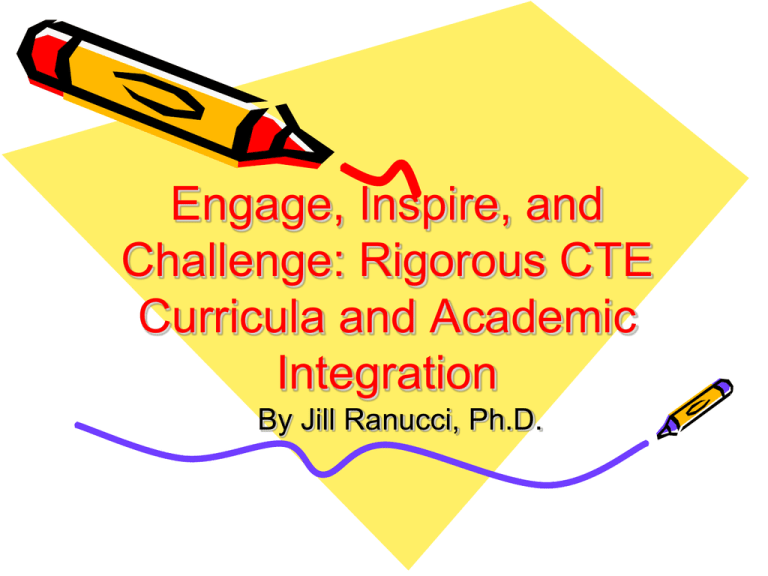
Engage, Inspire, and Challenge: Rigorous CTE Curricula and Academic Integration By Jill Ranucci, Ph.D. Catalina Foothills Demographics ◊ Number of students – Approx. 1650 (increased CTE participation over 100%) ◊ Graduation Rate/Socioeconomics ◊ CTE & State Tests ◊ Challenge All students! CTE Programs of Study (POS) Include Academic Credit, Common Core & 21st Century Skills • • • • • 21st Century Skills – Scientific Inquiry Global competitiveness (partnerships) Accountability Technical skills assessments Dual credit opportunities CFHS CTE includes engaging and differentiated instruction! • Hands On/Authentic Experiences • Build From Solid Foundation • Accountability – evidence/supported claims • PARCC type assessment • Seamless transitions to post secondary or certification STEM and CTE Programs of Study at CFHS Biosciences – Chemistry & Science Elective Agri-science – Biology, Chemistry, Physics-based 3rd year science & AP Engineering – Science Elective Performing & Graphic Arts – Fine Arts Journalism – English Elective Rigor, Relevance Questions To Consider Why should rigorous CTE courses be integrated or embedded into the general curricula? 1. 1. Consider impact on course selection if your CTE courses also offered academic credit Questions To Consider Does integrating common core into your CTE courses make sense? Consider the enduring possibilities. Students’ Viewpoints What is the added value for your student population of providing/integrating rigorous academics into your CTE curricula? Students’ Viewpoints How does CTE affect students’ career plans? How can we guarantee a viable, career and college ready curriculum? Agriscience Sequence Course Environmental Biology (Biology) Environmental Chemistry (Chemistry) Environmental Science (3rd year – physics based lab science) AP Environmental – (AP credit) Engineering - PLTW Intro to Engineering Design (science elective) Principles of Engineering (science elective) Digital Electronics (science elective) Senior Engineering Capstone (U of A 3 Engineering Credits) Bioscience Course Sequence Chemistry – Forensics (Chemistry Forensics – Biological and Chemical Applications (Science elective) Anatomy & Physiology (Science elective) Advisory Boards/CTSO’s/Certification Teachers, Industry leaders/businesses, Administrators, Students/Parents, Local Colleges and Universities Integrate and collaborate for students success Opportunities for internships, coop, and workplace experience Opportunities for industry certification and academic foundations to transition to postsecondary Strengthen with counselors (secondary & postsecondary) the transition to post-secondary education County wide advisory boards – advantages Advantages of Academic Integration Advantages: Academic credit – Common Core Rigorous curriculum/assessment Cross-walked standards Collaboration between math, science, administration, counseling and CTE department Industry standard skill acquisition Post-secondary recognition/credit AZ State Framework for Program of Study (POS) Legislation and policies Partnerships Professional Development Accountability and Evaluation Systems College/Career Readiness Standards Course Sequences Credit Transfer Agreements Guidance Counseling/Academic Advisement Teaching and Learning Strategies Challenges Faculty - availability and preparedness Stipends/Professional development for curricular development and revision Equipment/Supplies/ Marketing programs to district and community Graduation restrictions Dream BIG ! Take advantage of financial/professional development opportunities to expand Revise former curriculums - 21st Century skills Creative Curriculum for Common Core and Programs of Study Proposals need to include data/rationale Collaborate with your school and surrounding community Don’t be afraid to ask QUESTIONS? Contact Information Jill Ranucci, Ph.D. JTED/CTE Coordinator Catalina Foothills High School 4300 E. Sunrise Dr. Tucson, AZ 85718 (520) 209-8351 jranucci@cfsd16.org
